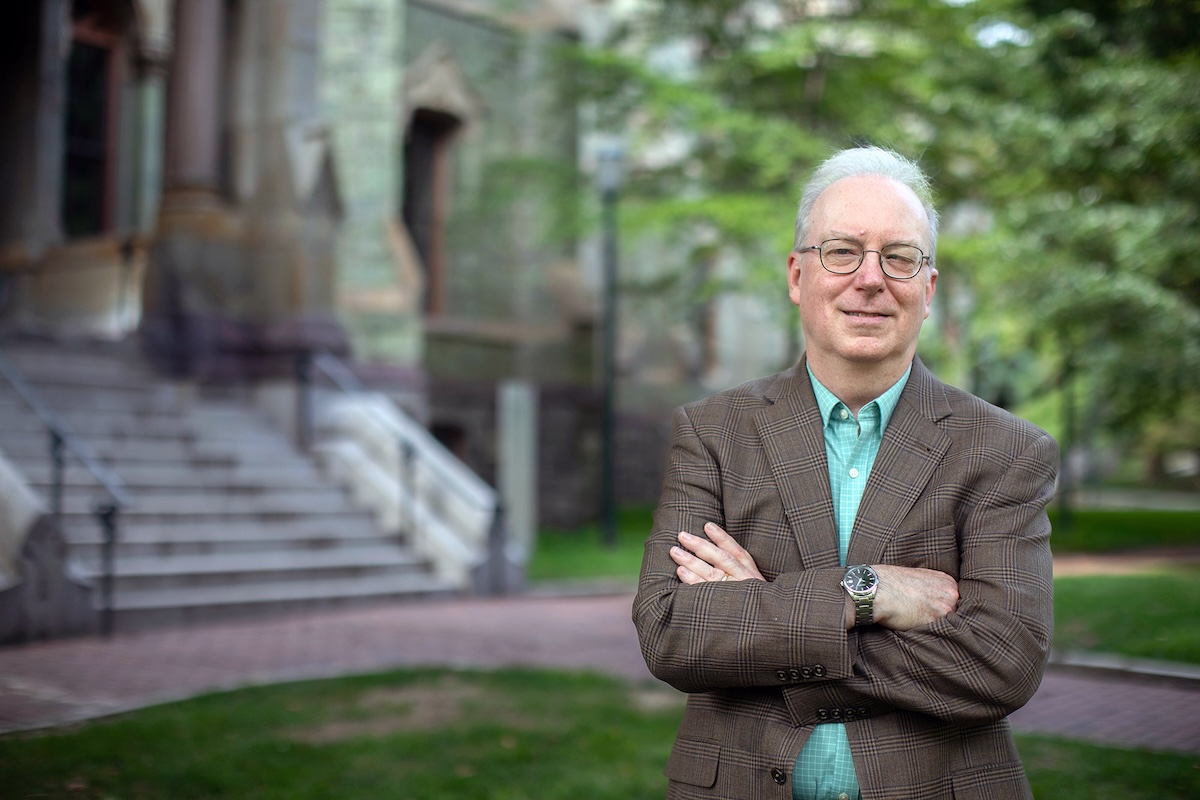Charles Kane, Christopher H. Browne Distinguished Professor of Physics at Penn’s School of Arts & Sciences.
(Image: Brooke Sietinsons)
Physicist Charles Kane, of the University of Pennsylvania’s School of Arts & Sciences (SAS), has been named the 2025 recipient of the Lorentz Medal. Awarded every four years by the Royal Netherlands Academy of Arts and Sciences, the medal is one of theoretical physics’ highest honors. Kane is being honored for his seminal research into material properties at the quantum level.
Kane’s groundbreaking work on topological insulators—materials with a special kind of electrical conduction on their surface—initiated a new field in condensed matter physics.
“We are truly honored to have Charlie as part of our community, having joined Penn as an assistant professor and spent his entire career here,” says Mark Trodden, dean of SAS and Thomas S. Gates Jr. Professor of Physics and Astronomy. “The discovery of topological insulators is one of the greatest scientific advances of the past 25 years or more, with potential applications ranging from low power electronics to creating a topological quantum computer. This research demonstrates the critical importance of the basic sciences and of the theoretical work that underlies so many pathbreaking real-world scientific advances.
“It’s also important to note Charlie’s deep commitment to undergraduate and graduate education,” Trodden says, “earning our highest teaching awards and mentoring many Ph.D. students who have gone on to make their own scientific contributions.”
“This is an incredible honor,” says Kane, the Christopher H. Browne Distinguished Professor of Physics. “Being recognized at this level reminds me of the many things I have to be grateful for. I thank my collaborators as well as the broader community of scientists who helped to make a new generation of electronic materials come to life.”
Twenty years ago, he and longtime collaborator at Penn Eugene Mele, Christopher H. Browne Distinguished Professor of Physics, developed a theoretical framework predicting the quantum spin-Hall effect, a novel state of matter in which the spin of an electron, rather than its charge alone, enables surface conduction without energy loss.
This insight launched the modern field of topological phases of matter, beginning with topological insulators.
In 2007, Kane and his doctoral student Liang Fu presented compelling theoretical evidence that a three-dimensional topological insulator could exist in nature, and they predicted specific materials which were later verified by expiriment. These materials simultaneously block electrical flow in their interior, while conducting it on their surface. Their work also suggested that these materials could host Majorana quasiparticles, exotic states that are their own antiparticles and could play a key role in advancing quantum computing.
Kane is a member of the National Academy of Sciences and the American Academy of Arts & Sciences. He has received numerous awards. Together with Mele, he was awarded the BBVA Foundation Frontiers of Knowledge Award, the 2019 Breakthrough Prize in Fundamental Physics, and the Benjamin Franklin Medal of the Franklin Institute. Kane has also been awarded the Dirac Prize of the International Center for Theoretical Physics, Oliver Buckley Prize of the American Physical Society, and Physics Frontiers Prize of the Fundamental Physics Prize Foundation.
In addition to his research, Kane has taught physics courses at all levels, ranging from topics in quantum condensed matter for advanced graduate students to introductory honors electromagnetism for freshmen, for which he received Penn’s Lindback Award for Distinguished Teaching.
Kane is the 25th laureate since the award’s inception in 1925. He is being awarded the medal on Dec. 11 in Leiden.

